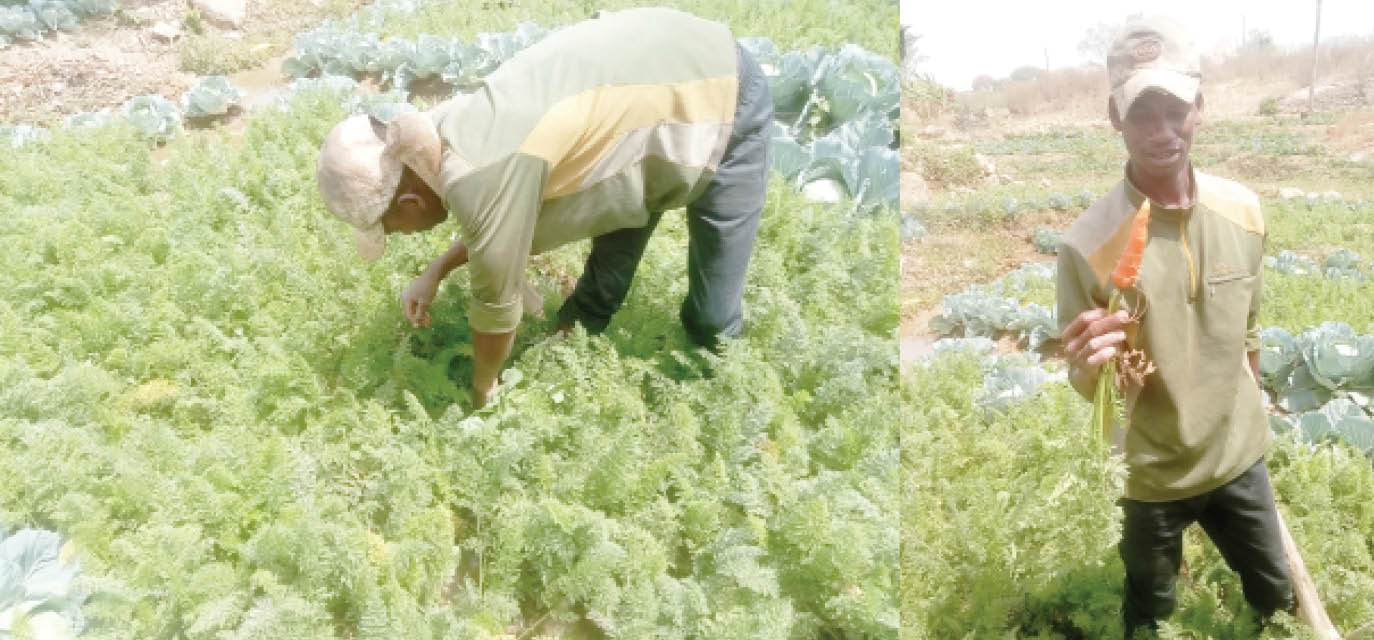In sub-Saharan Africa, Nigeria is recognized as the widest and largest producer of carrot. Nigeria produces approximately 225000 tonnes of carrot annually which is just 37.5 percent of its potential capacity. The revenue generated from this only can be as high as $720million which suggests that it was another robust source of revenue for the Nigerian economy.
However, in spite of the country’s capacity to produce carrot, farmers in Jos, the Plateau State Capital, said though the farming process is less expensive compared to other crops and vegetables, marketing the carrots after harvest was more difficult.
Murtala Hudu, a small-scale carrot farmer in Mista Ali community of Jos North Local Government Area of the state, said “Carrot farming is not capital intensive as it does not require huge money to invest. You only need small amount of money to start. You don’t need to apply much fertilizer like potato, cabbage or other vegetables.
“In fact, if you apply too much fertilizer, your farm will have problem. You can apply fertilizer just once and get your carrot done if properly cared for. What you rather need is to ensure adequate water supply to the farm throughout the period of three or four months,” Hudu said.
Boro: How cradle of Ijaw struggle became NYSC camp
Historical Trajectories of Catholicism in Africa: And the International insight of Faith
Hudu, who has been a carrot farmer for decades, said there was money in carrots farming, especially if it yields well and market is booming. He said “Although what you earn differs from time to time, in most cases, you earn a reasonable amount of money after the harvest. You can spend N50, 000 in the farming and make N300,000 or even N400,000. This is appreciable because you didn’t spent much to buy fertilizer or other farm inputs.”
Abdulkadir Danke, another carrot farmer in Gel community of Jos North LGA, also said it was easier to cultivate carrots than some vegetables.
“There is money in the cultivation of carrots, especially if you take proper care of it. If the market is favourable, we even sell it in the farm. In some cases, we don’t need to harvest it. Dealers would only come and buy the whole farm and harvest it themselves. In such case, we enjoy the market because we don’t need to harvest and take it to the market where lots of expenses would be made.”
Market problem
According to farmers, carrot farmers can lose their capital, particularly if there’s the product glut in the market. Hudu said “definitely, there can loss in carrot farming. There is no specific period when the price of the product drops, but once there’s excess supply in the market, the price come down drastically. You’d have no choice than to sell at any price because you don’t have storage facilities.
“When many farmers bring their carrots to the market, you can’t stop anybody from selling theirs or to take it back home. When it is huge in the market, it becomes useless and farmers do experience this moment. This is the major problem of carrot farming in our country,” Hudu added.
Buttressing his stance, the farmer cited that “Yesterday, a carrot farmer brought carrot from a whole hectare and sold it at the rate of N8000. You can imagine the degree of loss. Had it been the crop was not much in the market, he would have sold it for a higher amount.
For Hamza Sama’ila, also a carrot farmer, it is very difficult to overcome the problem of unexpected glut, adding that farmers have to bear in mind that the market could swing to any direction and nothing could be done to remedy the situation.
He said “Once it matures, everybody brings theirs to the market and we just have to bear whatever situation it creates – whether favourable or not,” he added.
He however said the cost of the product increases between April and July – before we go deep into the rainy season. During that time, not all farmers engage in carrot farming, and those who have planted in January had already exhausted theirs and the ones planted during the rainy season wouldn’t yet be matured.
Why farmers lose money
Alhaji Tanimu Isa, chairman of Carrot Market in Jos, said participation of many people in the cultivation of carrots was the main reason the product was not valuable any more as all the farmers harvest their products the same time and take it to the market.
“Unlike before, when Jos was the only place where carrot was cultivated, states like Bauchi, Kano, amongst others, are now producing carrots in commercial quantity, which is why you always have the products in the market in abundance, thereby affecting the price.
“Jos is the central market of carrots. Most of the carrots produced in Kano, Bauchi, Jigawa and sometimes from Cameroon are brought to Jos, and from Jos people buy and take to states in the southern part of the country,” the chairman said.
Isa further said that when there was delay in transporting them to the south after harvest, they get rotten, saying “this challenge is often encountered and results in huge loss to us.”
The chairman also said lack of processing companies contributes to the poor price of the commodity. “Once there are companies that would process them, carrot cultivation won’t be a problem any more.”




